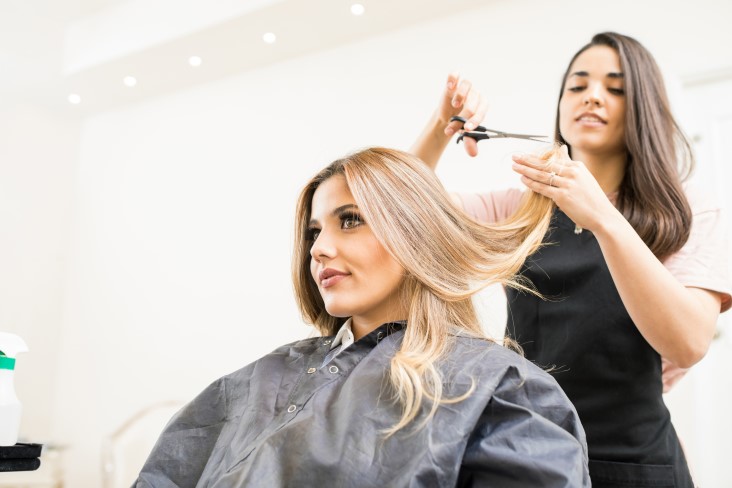
A strong hair stylist can make or break an individual’s confidence. As a professional stylist, you may offer haircutting, hair coloring, scalp massage, and other types of treatments. You might help people handle oily hair and dry hair, manage a beauty salon, and work with salon brands. It’s one of the first styling jobs people think of when they hear the word, “cosmetologist.” Here’s what you need to know to become a hair stylist and start doing this incredible job.
Job Outlook
According to the Bureau of Labor Statistics, the employment of barbers, hair stylists, and cosmetologists is expected to grow by 19% by 2030, which is much faster than the general average. Once you attain your cosmetology license, you can join hair stylists doing these jobs and many others:
- Set hairstyling
- Personal hairstyling
- Beauty brand fashion consultant
- Fashion magazine and photoshoot hair stylist
- Cosmetology educator
- Salon owner or manager
Make It Happen
There are four general steps you’ll need to take to become a hair stylist.
1. Education
First, you need a qualification from a certified cosmetology school. Each state sets specific requirements for cosmetology education, including the number of hours required and what each student must learn. Cosmetology school is a type of vocational school, so you generally need a high school diploma or GED to start, but you likely won’t need secondary school education to apply. This will take the place of secondary school education that you might otherwise apply to.
Different specialists might want to look for different types of cosmetology training. A barber program, for example, is better for individuals who want to work on masculine styles or facial hair. In these different programs, you’ll learn advanced techniques and specialized knowledge that will help you become a successful candidate for a job.
Additionally, after you’ve become a hair professional, you should keep an eye on continuing education. Whether you’re learning how to do extreme color or staying up to date on recent beauty trends, talented hair stylists need to know how to keep their client base and provide the best beauty treatments of the current era.
2. Licensing
If you want to legally practice hair styling in the United States, you’ll need to get a license. The licensing process will be different for each state, but you’ll often need to complete a certain number of hours in a cosmetology program, pass a test, and pay a licensing fee.
3. Experience
It’s important that you have on-the-job experience as a hair stylist even before you get your first job. The more job experience you accumulate, the more you’ll be able to do as a hair professional. This will become an excellent resource for you to build on over time.
A portfolio can also be critical to show that you’re the ideal candidate for a specific job. They show your eye for design and your cosmetology training. You can even take great portfolio shots with your phone as long as they’re well-lit, in focus, and good at showing off your work. Talented hair stylists still need to show off their work to be successful candidates.
4. Equipment
When you first start, you’ll need a basic kit that includes general styling tools, such as multiple pairs of high-quality scissors and different combs and brushes. If you’re working for a salon, they will also provide hair stylists with equipment, such as straighteners and hair dryers. If you’re working for yourself or renting space in a salon, you’ll have to provide that equipment yourself.
When it comes to hair treatment products, you should expect that those materials will be available at the hair salon. From conditioning agents to hair tint products, salon usage works as a kind of product demonstration for the client. Most hair stylists will consider the use of salon brands at their beauty salon as part of the cost of running a salon, as it helps maintain a customer base and provides an excellent resource for high-quality hair management.
As you develop a specialty, you’ll determine the equipment that works best for you. Celebrity hair stylists, for example, may provide personal services on a regular basis that aren’t covered here, utilizing special compounds and analog hair styling tools for dry hair and oily hair. The more you work in your niche, the better you’ll understand the hair treatment products that function well as solutions to hair problems your clients are experiencing.
Skills and Attributes
A great cosmetologist will need several strong skills in a surprising array of areas. You might think of cosmetologists as primarily being good at cutting and styling hair, but there are significantly more areas, such as people skills, that you’ll need to excel in if you want to succeed. Here are a few of the wide range of skills you’ll want to have:
- Arm-hand steadiness
- Creativity
- Organization
- Communication skills
- Taking payments from patrons
- Sales techniques
- People skills
- Handling cash registers
- Physical stamina
Of course, you also need to know how to style hair and make sure someone looks great. Talented hair stylists know how to please their customer base in as many ways as possible. Here are just a few skills that are important when providing hair-related beauty services:
- Knowing hair care products
- Determining hair styles based on physical features
- Finding solutions to hair issues
- Applying hair extensions
- Determining hair type
- Taking corrective action for mistakes
- Creating a natural appearance
- A general eye for design
Remember that these skills can also impact how quickly you grow and even your salary potential, as tipping is often a large part of your income as a hair stylist.
Final Thoughts

Hair styling is an incredibly enjoyable field with a variety of careers available, from salon owner to celebrity hair stylists. Becoming the ideal candidate in a sea full of talented hair stylists isn’t easy, but the more you know, the better your chances will be.
If you’re thinking about becoming a hair stylist, check out the Ogle School cosmetology program to find out more. This is your first step to a career that may just be your ultimate passion.




Comments are closed.